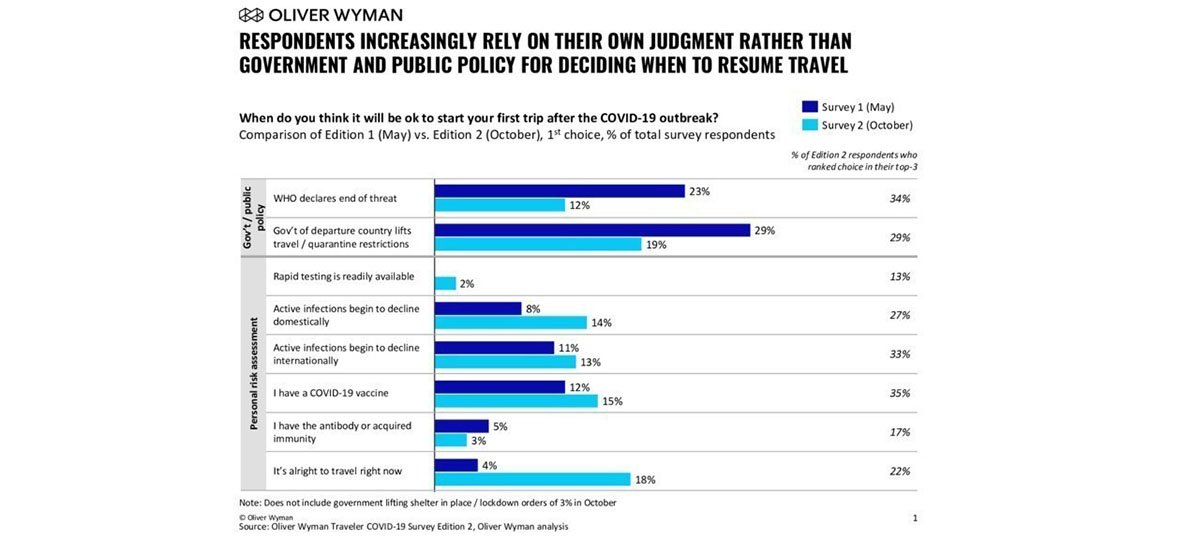While news about a vaccine at last seems promising, a new global survey (including Canada) says one in five travellers say it is okay to travel now and are not waiting for an antidote to COVID-19 to be available.
“Vaccines are important but personal judgement is still the leading factor for deciding to travel, ahead of government restrictions and advice from the World Health Organization,” says Bruce Spear, a partner with Oliver Wyman, which produced the report. “This means the travel industry must focus on measures that increase individual customer safety such as mandatory masks, cleaning and rapid testing and not wait for governments to issue directives.”
Entitled “Anticipating the Travel Recovery,” the report found several other changes in traveller behaviour since an initial survey was conducted in late April/early May.
For example:
• Leisure Travel – Interest in leisure travel remains strong and has grown since May, with 63% of respondents expecting to travel the same amount or more post-pandemic. While most travellers in the US, Spain, Italy, China, and Australia are planning domestic trips, travellers in Canada, UK, France, and Germany are planning international locations (mostly in their home region) for their next leisure trip post-COVID. The No. 1 driver for these leisure trips globally is to visit friends and family.
• Business Travel – 43% of all respondents who travel for business plan to travel less in the future, a 16-point increase from May. Business travellers have gotten more comfortable with teleconferencing, but only 53% agree that they can develop new relationships via teleconferencing. This drops to 47% for business travellers under 30. While half of business travellers expect no change in trip duration, 30% expect to shorten their trips when possible, which will impact hotel stays.
• Modes of transport – Overall respondents are more comfortable with various transportation options than they were in May. Half are now comfortable taking a flight and almost 60% are comfortable staying at a hotel. However, less than a third are comfortable using public transportation or ride sharing.
• Cruises – In May, the cruise industry was still reeling from news of passengers quarantined at sea. Since then, the gap between cruises and other experiences involving significant interaction with others has closed. Respondents now feel as comfortable taking a cruise as attending a convention or going to a concert or sporting event. Past cruisers are more comfortable than first timers.
Pandemic travel
The survey also asked people about actual travel they have done during the pandemic. Overall, 31% have travelled by air and 24% by train (more than two hours) since March; 60% of these trips were primarily for leisure.
Half of travellers (51%) were excited to travel, while only a quarter reported being reluctant. Almost 80% of those who travelled were satisfied with most components of their experience, including check-in, security, boarding process, passenger and crew PPE. Travellers were less impressed with food and beverage and airport/station retail because many of these amenities have been nearly eliminated.
Price remains the top factor for consumer choice, followed by cleaning policies and treatment of travellers. The exception is in China, where aircraft cleaning policies and treatment by the airline outrank price. Travellers view cleaning and mask mandates as the most important health and safety measures, but 40% would still like to see an empty seat next to them on planes and trains.
“As we continue to adjust to our new COVID reality, travel providers will see a shift in their core customer base due to reduced business demand,” said Jessica Stansbury, a partner with Oliver Wyman. “Leisure travel will continue to drive the recovery and addressing new customer expectations will be critical. There is no wiggle room for travel companies when it comes to defining, communicating, and enforcing policies for cleanliness and ensuring safety.”
The survey, conducted by management consulting firm Oliver Wyman, which has offices in 60 cities across 29 countries, involved more than 4,600 people in nine countries (Australia, Canada, China, France, Germany, Italy, Spain, UK, and US) all of whom had flown at least once in 2019. A third also have travelled by air and/or rail in the past six months.


